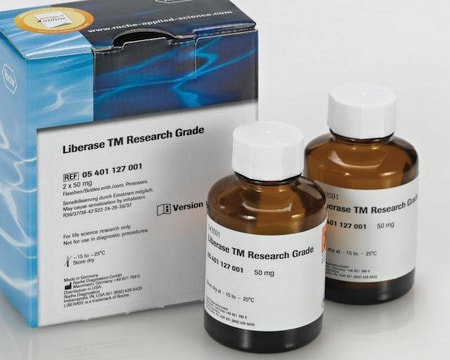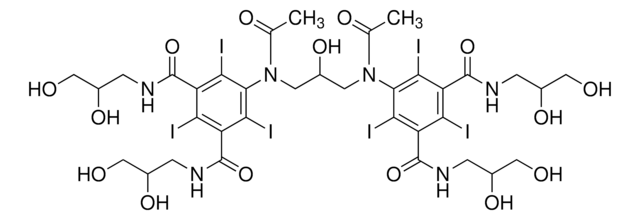G9779
Gey′s Balanced Salt Solution
liquid, sterile-filtered, suitable for cell culture
Synonym(s):
GBSS
Sign Into View Organizational & Contract Pricing
All Photos(1)
About This Item
UNSPSC Code:
12352207
NACRES:
NA.75
Recommended Products
sterility
sterile-filtered
form
liquid
technique(s)
cell culture | mammalian: suitable
impurities
endotoxin, tested
components
glucose: 1.0 g/L
phenol red: no
NaHCO3: 2.27 g/L
shipped in
ambient
storage temp.
2-8°C
General description
Gey′s Balanced Salt Solution is a phosphate bicarbonate buffered cell suspension and washing solution. A complete balanced salt solution with a unique combination of ""salt forms"". Contains the same five basic ions as EBSS, HBSS and DPBS.
Application
Gey′s Balanced Salt Solution has been used in:
- organotypic mouse brain slice culture
- isolation of primary murine liver sinusoidal endothelial cells (LSECs)
- organotypic hippocampal slice cultures
Storage Class Code
12 - Non Combustible Liquids
WGK
nwg
Flash Point(F)
Not applicable
Flash Point(C)
Not applicable
Choose from one of the most recent versions:
Already Own This Product?
Find documentation for the products that you have recently purchased in the Document Library.
Customers Also Viewed
Victor Olsavszky et al.
Gene, 768, 145284-145284 (2020-11-02)
The Class H scavenger receptors Stabilin-1 (Stab1) and Stabilin-2 (Stab2) are two of the most highly expressed genes in liver sinusoidal endothelial cells (LSECs). While Stab1-deficient (Stab1KO) and Stab2-deficient (Stab2KO) mice are phenotypically unremarkable, Stab1/2-double-deficient (StabDKO) mice exhibit perisinusoidal liver
Tim C Chang et al.
Lab on a chip, 14(23), 4540-4551 (2014-10-03)
There is a critical unmet need to tailor chemotherapies to individual patients. Personalized approaches could lower treatment toxicity, improve the patient's quality of life, and ultimately reduce mortality. However, existing models of drug activity (based on tumor cells in culture
Pei-Hsuan Wu et al.
Nature genetics, 52(7), 728-739 (2020-07-01)
Pachytene PIWI-interacting RNAs (piRNAs), which comprise >80% of small RNAs in the adult mouse testis, have been proposed to bind and regulate target RNAs like microRNAs, cleave targets like short interfering RNAs or lack biological function altogether. Although piRNA pathway
Dan Xu et al.
The Journal of experimental medicine, 215(4), 1169-1186 (2018-03-01)
The pathophysiology of drug-resistant pediatric epilepsy is unknown. Flow cytometric analysis of inflammatory leukocytes in resected brain tissues from 29 pediatric patients with genetic (focal cortical dysplasia) or acquired (encephalomalacia) epilepsy demonstrated significant brain infiltration of blood-borne inflammatory myeloid cells
Soichiro Yamanaka et al.
Developmental cell, 51(1), 21-34 (2019-09-03)
Facultative heterochromatin forms and reorganizes in response to external stimuli. However, how the initial establishment of such a chromatin state is regulated in cell-cycle-arrested cells remains unexplored. Mouse gonocytes are arrested male germ cells, at which stage the genome-wide DNA
Our team of scientists has experience in all areas of research including Life Science, Material Science, Chemical Synthesis, Chromatography, Analytical and many others.
Contact Technical Service













